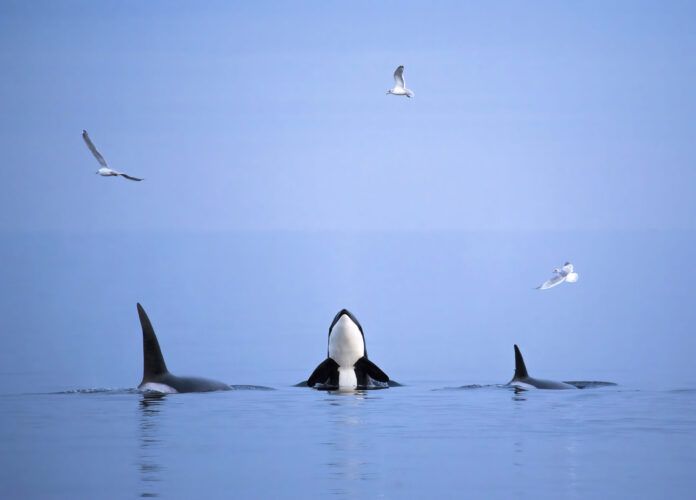Alaskan fisheries relying on salmon from BC rivers have had their permits cancelled by a US court, to protect endangered orcas.
Judge Richard Jones made the decision in Seattle court May 2 in response to a lawsuit filed by the Wild Fish Conservancy. The judge found US government plans to protect salmon are too vague, and actually take food away from the struggling southern resident killer whale population, violating endangered species laws.
His ruling shuts down the summer and winter Chinook salmon fisheries around the Alaska panhandle. Nearly 97% of the salmon caught in those fisheries are from BC, Washington, and Oregon, not Alaska.
The southern resident orcas range from California to BC and rely almost exclusively on Chinook salmon. Their numbers have been declining in recent years; scientists believe it’s because they are having trouble accessing enough food.
Last month Fisheries and Oceans Canada announced measures to protect the orcas, including continuing restrictions on Chinook fishing. The measures include:
- Two mandatory Speed Restricted Zones near Swiftsure Bank, in which all vessels will be restricted to a maximum speed of 10 knots, effective June 1 to November 30, 2023. This measure was first co-developed with Pacheedaht First Nation and incorporates the latest scientific advice about habitat use.
- The requirement for vessels to stay at least 400 m away from all killer whales in Southern British Columbia coastal waters between Campbell River and Ucluelet, including Barkley and Howe Sound. This is now in effect until May 31, 2024. If killer whales approach any vessel, boaters should put their engine in neutral and wait for the animals to pass.
- An agreement with local whale watching and ecotourism industry partners to abstain from offering or promoting tours viewing Southern Resident killer whales.
- Two interim sanctuary zones off Pender Island and Saturna Island from June 1 to November 30, 2023. No vessel traffic will be permitted in these areas during this period, subject to certain exceptions for emergency situations and Indigenous vessels.
- For the 2023 season, Transport Canada is reinstating the avoidance distance requirements.
- Fishery closures for commercial and recreational salmon fisheries for the Southern Gulf Islands, the Strait of Juan de Fuca and the Mouth of the Fraser River areas in 2023. The closures will be expanded around Swiftsure Bank this year to support further protection for the whales. These actions will help protect the whales’ access to salmon and minimize disturbance in their key foraging areas. Adjustments to the fishing closures are based on the best available information regarding whale presence, their foraging areas and impacts of vessel disturbance.
- New for 2023, the Southern Gulf Islands closure protocol for commercial and recreational salmon fisheries will be in effect from the first confirmed presence of Southern Resident killer whales in the area and extend to November 30, 2023. This effort recognizes that Southern Resident killer whales are being reported in the Salish Sea in greater numbers later into the fall.
- Continuing to help reduce contaminants in the environment affecting whales and their prey. Long-term actions focus on enhancing regulatory controls, monitoring and research, sharing information and data, and expanding outreach and education. Recent progress includes updates to the online Pollutants Affecting Whales and their Prey Inventory Tool, proposed amendments to the Prohibition of Certain Toxic Substances Regulations, 2012 and development of environmental quality guidelines.
The Enhancing Cetacean Habitat and Observation (ECHO) Program will coordinate voluntary underwater noise reduction initiatives encouraging ship operators to slow down or stay distanced while traveling through key areas of Southern Resident killer whale critical habitat in Haro Strait, Boundary Pass, Swiftsure Bank, and the Strait of Juan de Fuca. In 2022, these initiatives reduced underwater sound intensity by approximately 50% in key foraging areas for Southern Resident killer whales.
The Government of Canada has been conducting further analysis on advancing protections for killer whales in British Columbia in the context of feedback received and in relation to the Marine Mammal Regulations. In the coming year, DFO will be launching a consultation process to consider adjustments to approach distances for killer whales on the Pacific coast under the Marine Mammal Regulations of the Fisheries Act. Any potential changes to the Marine Mammal Regulations will be based on partner and stakeholder feedback to date, as part of the consultation process to come as well as scientific advice.
The State of Alaska plans to appeal the May 2 ruling.




